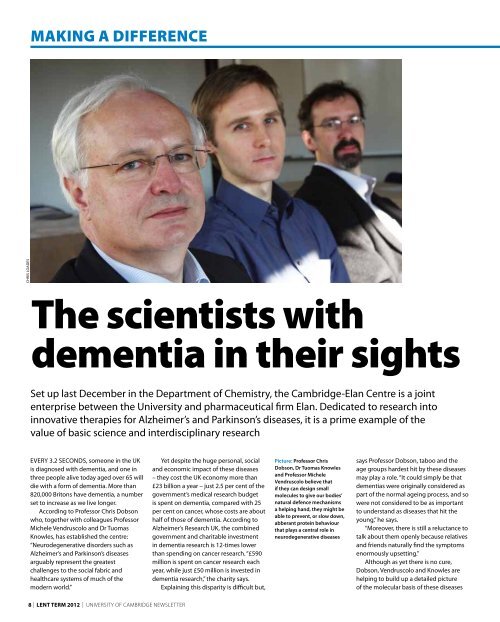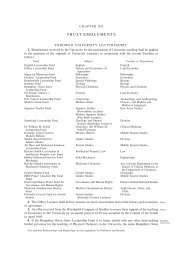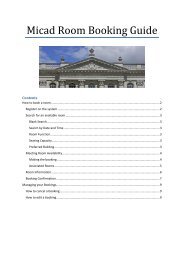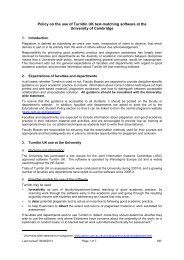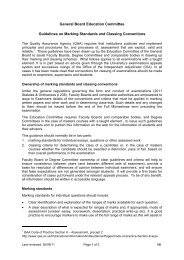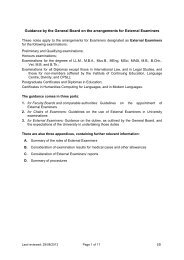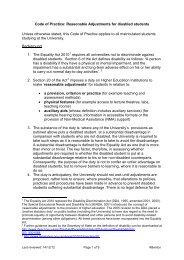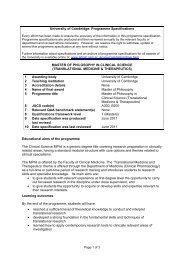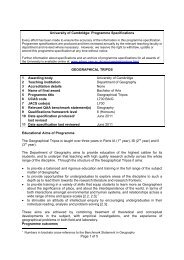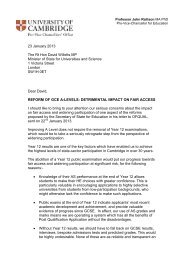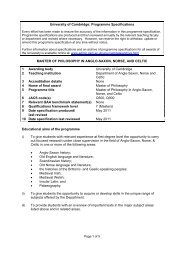January/February - the University Offices - University of Cambridge
January/February - the University Offices - University of Cambridge
January/February - the University Offices - University of Cambridge
Create successful ePaper yourself
Turn your PDF publications into a flip-book with our unique Google optimized e-Paper software.
making a difference<br />
Chris Loades<br />
The scientists with<br />
dementia in <strong>the</strong>ir sights<br />
Set up last December in <strong>the</strong> Department <strong>of</strong> Chemistry, <strong>the</strong> <strong>Cambridge</strong>-Elan Centre is a joint<br />
enterprise between <strong>the</strong> <strong>University</strong> and pharmaceutical firm Elan. Dedicated to research into<br />
innovative <strong>the</strong>rapies for Alzheimer’s and Parkinson’s diseases, it is a prime example <strong>of</strong> <strong>the</strong><br />
value <strong>of</strong> basic science and interdisciplinary research<br />
Every 3.2 seconds, someone in <strong>the</strong> UK<br />
is diagnosed with dementia, and one in<br />
three people alive today aged over 65 will<br />
die with a form <strong>of</strong> dementia. More than<br />
820,000 Britons have dementia, a number<br />
set to increase as we live longer.<br />
According to Pr<strong>of</strong>essor Chris Dobson<br />
who, toge<strong>the</strong>r with colleagues Pr<strong>of</strong>essor<br />
Michele Vendruscolo and Dr Tuomas<br />
Knowles, has established <strong>the</strong> centre:<br />
“Neurodegenerative disorders such as<br />
Alzheimer’s and Parkinson’s diseases<br />
arguably represent <strong>the</strong> greatest<br />
challenges to <strong>the</strong> social fabric and<br />
healthcare systems <strong>of</strong> much <strong>of</strong> <strong>the</strong><br />
modern world.”<br />
Yet despite <strong>the</strong> huge personal, social<br />
and economic impact <strong>of</strong> <strong>the</strong>se diseases<br />
– <strong>the</strong>y cost <strong>the</strong> UK economy more than<br />
£23 billion a year – just 2.5 per cent <strong>of</strong> <strong>the</strong><br />
government’s medical research budget<br />
is spent on dementia, compared with 25<br />
per cent on cancer, whose costs are about<br />
half <strong>of</strong> those <strong>of</strong> dementia. According to<br />
Alzheimer’s Research UK, <strong>the</strong> combined<br />
government and charitable investment<br />
in dementia research is 12-times lower<br />
than spending on cancer research. “£590<br />
million is spent on cancer research each<br />
year, while just £50 million is invested in<br />
dementia research,” <strong>the</strong> charity says.<br />
Explaining this disparity is difficult but,<br />
Picture: Pr<strong>of</strong>essor Chris<br />
Dobson, Dr Tuomas Knowles<br />
and Pr<strong>of</strong>essor Michele<br />
Vendruscolo believe that<br />
if <strong>the</strong>y can design small<br />
molecules to give our bodies’<br />
natural defence mechanisms<br />
a helping hand, <strong>the</strong>y might be<br />
able to prevent, or slow down,<br />
abberant protein behaviour<br />
that plays a central role in<br />
neurodegenerative diseases<br />
says Pr<strong>of</strong>essor Dobson, taboo and <strong>the</strong><br />
age groups hardest hit by <strong>the</strong>se diseases<br />
may play a role. “It could simply be that<br />
dementias were originally considered as<br />
part <strong>of</strong> <strong>the</strong> normal ageing process, and so<br />
were not considered to be as important<br />
to understand as diseases that hit <strong>the</strong><br />
young,” he says.<br />
“Moreover, <strong>the</strong>re is still a reluctance to<br />
talk about <strong>the</strong>m openly because relatives<br />
and friends naturally find <strong>the</strong> symptoms<br />
enormously upsetting.”<br />
Although as yet <strong>the</strong>re is no cure,<br />
Dobson, Vendruscolo and Knowles are<br />
helping to build up a detailed picture<br />
<strong>of</strong> <strong>the</strong> molecular basis <strong>of</strong> <strong>the</strong>se diseases<br />
8 | lent term 2012 | UNIVERSITY OF CAMBRIDGE Newsletter


